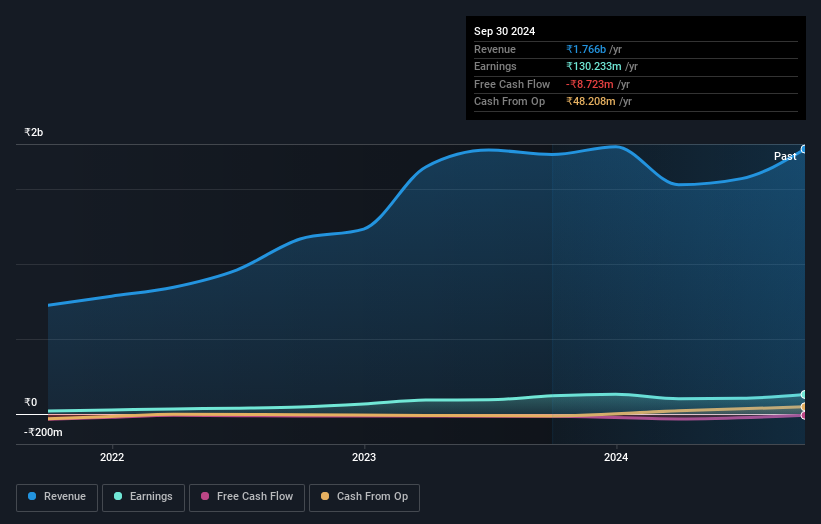- India
- /
- Trade Distributors
- /
- NSEI:HARDWYN
Hardwyn India Limited (NSE:HARDWYN) CEO Rubaljeet Sayal, the company's largest shareholder sees 14% reduction in holdings value

Key Insights
- Insiders appear to have a vested interest in Hardwyn India's growth, as seen by their sizeable ownership
- A total of 3 investors have a majority stake in the company with 63% ownership
- Ownership research, combined with past performance data can help provide a good understanding of opportunities in a stock
If you want to know who really controls Hardwyn India Limited (NSE:HARDWYN), then you'll have to look at the makeup of its share registry. With 90% stake, individual insiders possess the maximum shares in the company. Put another way, the group faces the maximum upside potential (or downside risk).
And following last week's 14% decline in share price, insiders suffered the most losses.
Let's take a closer look to see what the different types of shareholders can tell us about Hardwyn India.
Check out our latest analysis for Hardwyn India

What Does The Lack Of Institutional Ownership Tell Us About Hardwyn India?
Institutional investors often avoid companies that are too small, too illiquid or too risky for their tastes. But it's unusual to see larger companies without any institutional investors.
There are multiple explanations for why institutions don't own a stock. The most common is that the company is too small relative to funds under management, so the institution does not bother to look closely at the company. It is also possible that fund managers don't own the stock because they aren't convinced it will perform well. Hardwyn India's earnings and revenue track record (below) may not be compelling to institutional investors -- or they simply might not have looked at the business closely.

Hedge funds don't have many shares in Hardwyn India. With a 24% stake, CEO Rubaljeet Sayal is the largest shareholder. For context, the second largest shareholder holds about 20% of the shares outstanding, followed by an ownership of 19% by the third-largest shareholder. Interestingly, the second-largest shareholder, SwaranJeet Sayal is also Top Key Executive, again, pointing towards strong insider ownership amongst the company's top shareholders.
To make our study more interesting, we found that the top 3 shareholders have a majority ownership in the company, meaning that they are powerful enough to influence the decisions of the company.
While it makes sense to study institutional ownership data for a company, it also makes sense to study analyst sentiments to know which way the wind is blowing. We're not picking up on any analyst coverage of the stock at the moment, so the company is unlikely to be widely held.
Insider Ownership Of Hardwyn India
The definition of an insider can differ slightly between different countries, but members of the board of directors always count. The company management answer to the board and the latter should represent the interests of shareholders. Notably, sometimes top-level managers are on the board themselves.
Insider ownership is positive when it signals leadership are thinking like the true owners of the company. However, high insider ownership can also give immense power to a small group within the company. This can be negative in some circumstances.
Our most recent data indicates that insiders own the majority of Hardwyn India Limited. This means they can collectively make decisions for the company. That means they own ₹7.9b worth of shares in the ₹8.9b company. That's quite meaningful. Most would argue this is a positive, showing strong alignment with shareholders. You can click here to see if those insiders have been buying or selling.
General Public Ownership
With a 10% ownership, the general public, mostly comprising of individual investors, have some degree of sway over Hardwyn India. While this size of ownership may not be enough to sway a policy decision in their favour, they can still make a collective impact on company policies.
Next Steps:
It's always worth thinking about the different groups who own shares in a company. But to understand Hardwyn India better, we need to consider many other factors. For instance, we've identified 1 warning sign for Hardwyn India that you should be aware of.
Of course this may not be the best stock to buy. So take a peek at this free free list of interesting companies.
NB: Figures in this article are calculated using data from the last twelve months, which refer to the 12-month period ending on the last date of the month the financial statement is dated. This may not be consistent with full year annual report figures.
Valuation is complex, but we're here to simplify it.
Discover if Hardwyn India might be undervalued or overvalued with our detailed analysis, featuring fair value estimates, potential risks, dividends, insider trades, and its financial condition.
Access Free AnalysisHave feedback on this article? Concerned about the content? Get in touch with us directly. Alternatively, email editorial-team (at) simplywallst.com.
This article by Simply Wall St is general in nature. We provide commentary based on historical data and analyst forecasts only using an unbiased methodology and our articles are not intended to be financial advice. It does not constitute a recommendation to buy or sell any stock, and does not take account of your objectives, or your financial situation. We aim to bring you long-term focused analysis driven by fundamental data. Note that our analysis may not factor in the latest price-sensitive company announcements or qualitative material. Simply Wall St has no position in any stocks mentioned.
About NSEI:HARDWYN
Hardwyn India
Manufactures and trades in architectural hardware and glass fittings to residential and commercial structures under the Hardwyn brand in India.
Excellent balance sheet with questionable track record.
Similar Companies
Market Insights
Community Narratives




